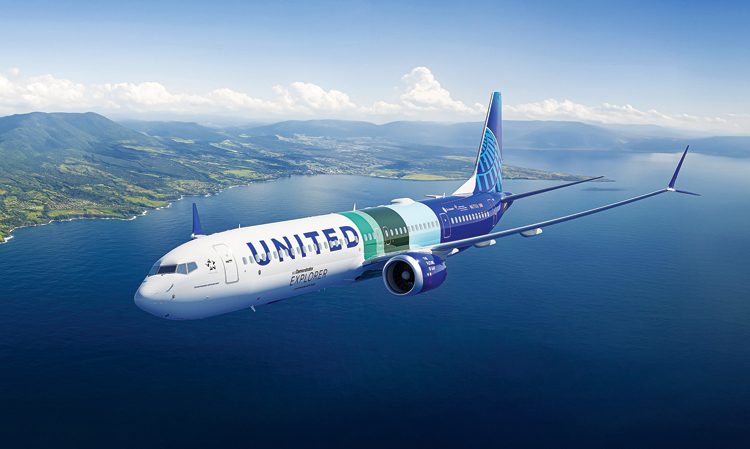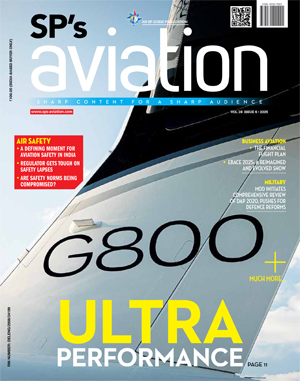INDIAN ARMED FORCES CHIEFS ON OUR RELENTLESS AND FOCUSED PUBLISHING EFFORTS

The insightful articles, inspiring narrations and analytical perspectives presented by the Editorial Team, establish an alluring connect with the reader. My compliments and best wishes to SP Guide Publications.

"Over the past 60 years, the growth of SP Guide Publications has mirrored the rising stature of Indian Navy. Its well-researched and informative magazines on Defence and Aerospace sector have served to shape an educated opinion of our military personnel, policy makers and the public alike. I wish SP's Publication team continued success, fair winds and following seas in all future endeavour!"

Since, its inception in 1964, SP Guide Publications has consistently demonstrated commitment to high-quality journalism in the aerospace and defence sectors, earning a well-deserved reputation as Asia's largest media house in this domain. I wish SP Guide Publications continued success in its pursuit of excellence.
- The layered Air Defence systems that worked superbly, the key element of Operation Sindoor
- Operation Sindoor | Day 2 DGMOs Briefing
- Operation Sindoor: Resolute yet Restrained
- India's Operation Sindoor Sends a Clear Message to Terror and the World – ‘ZERO TOLERANCE’
- Japan and India set forth a defence cooperation consultancy framework, talks on tank and jet engines
Boeing, NASA, United to Test SAF Benefits

In a collaboration to strengthen sustainability in aviation, Boeing is partnering with NASA and United Airlines for inflight testing to measure how sustainable aviation fuel (SAF) affects contrails and non-carbon emissions, in addition to reducing the fuel’s life cycle climate impact.
Boeing’s second ecoDemonstrator Explorer, a 737-10 destined for United Airlines, will fly with 100 per cent SAF and conventional jet fuel in separate tanks and alternate fuels during testing. NASA’s DC-8 Airborne Science Lab will fly behind the commercial jet and measure emissions produced by each type of fuel and contrail ice particles. NASA satellites will capture images of contrail formation as part of the testing.
The researchers aim to understand how advanced fuels, engine combustor designs and other technologies may reduce atmospheric warming. For example, tests will assess how SAF affects the characteristics of contrails, the persistent condensation trails produced when airplanes fly through cold, humid air. While their full impact is not yet understood, some research has suggested certain contrails can trap heat in the atmosphere.
World Energy is supplying SAF for the tests from its Paramount, Calif., facility. Additional support includes:
- US Federal Aviation Administration (FAA) is providing funding through the ASCENT Center of Excellence
- GE Aerospace is providing technical expertise and project funding
- German Aerospace Center (Deutsches Zentrum für Luft- und Raumfahrt or DLR) is providing experts and instrumentation.
The project is the latest phase in a multi-year partnership between Boeing and NASA to analyze how SAF can reduce emissions and enable other environmental benefits. Compared to conventional jet fuel, SAF – made from a range of sustainably produced feedstocks – can reduce emissions by up to 85 per cent over the fuel’s life cycle and offers the greatest potential to reduce aviation CO2 over the next 30 years. SAF also produces less soot which can improve air quality near airports.
What the test partners are saying:
- “We are honored to collaborate with NASA, United Airlines, and other valued partners on research that will strengthen the industry’s understanding of the benefits of SAF beyond reducing carbon emissions,” said Boeing Chief Sustainability Officer Chris Raymond. “We’ve solved hard problems before, and if we continue to take meaningful actions, I’m confident we’ll achieve a more sustainable aerospace future, together.”
- “Flight testing is complex and resource-intensive, yet it’s the gold standard for understanding how sustainable aerospace innovations affect changes in contrails and climate,” says Rich Wahls, NASA mission integration manager for the Sustainable Flight National Partnership. “This is why we’re bringing NASA’s DC-8 to bear on this collaboration, where the valuable flight data will improve our predictive models.”
- “This collaboration between Boeing, NASA and United has the potential to not only help us better understand contrails but to provide the full scope of what our transition to SAF can provide beyond greenhouse-gas reductions,” said United Chief Sustainability Officer Lauren Riley.
- “We at GE Aerospace proudly support this groundbreaking research collaboration that will deepen our scientific understanding of the impact of SAF on emissions for a more sustainable future of flight,” said GE Aerospace Vice President of Engineering Mohamed Ali.
- “To achieve climate-compatible aviation, we need close international cooperation. The German Aerospace Center has decades of experience in research on the climate impact of the entire aviation system by advancing measurement technology and simulations,” says Markus Fischer, DLR Divisional Board Member for Aeronautics. “The continuation of transatlantic cooperation now finds a new summit and underlines the international commitment to reduce the climate impact from aviation’s CO2 and non-CO2 effects.”
The Boeing ecoDemonstrator programme was expanded this year to include Explorer airplanes focused on short-term, specific test projects. Boeing and NASA conducted SAF emissions ground testing on an Alaska Airlines 737-9 in 2021 and ecoDemonstrator 777-200ER and 787-10 flight-test jets in 2022. Boeing has committed to deliver commercial airplanes compatible with 100 per cent SAF by 2030.
The 737-10 is the largest airplane in Boeing’s single-aisle 737 MAX family, which reduces fuel use and emissions by 20 per cent compared to airplanes it replaces.





